新概念英语第二册课堂笔记:第2课
胶囊助学计划新概念英语二笔记
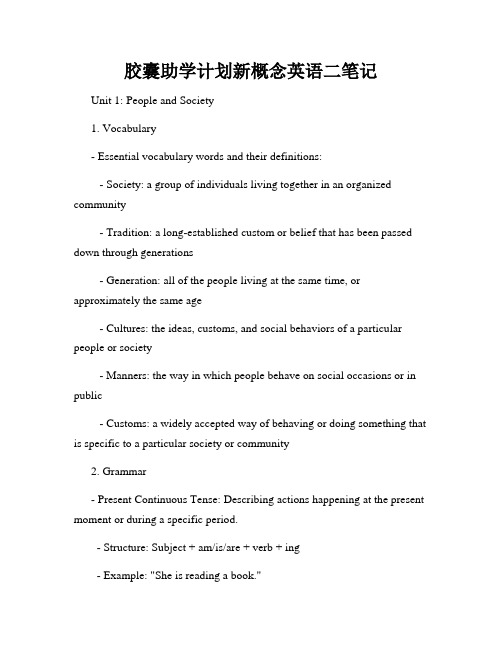
胶囊助学计划新概念英语二笔记Unit 1: People and Society1. Vocabulary- Essential vocabulary words and their definitions:- Society: a group of individuals living together in an organized community- Tradition: a long-established custom or belief that has been passed down through generations- Generation: all of the people living at the same time, or approximately the same age- Cultures: the ideas, customs, and social behaviors of a particular people or society- Manners: the way in which people behave on social occasions or in public- Customs: a widely accepted way of behaving or doing something that is specific to a particular society or community2. Grammar- Present Continuous Tense: Describing actions happening at the present moment or during a specific period.- Structure: Subject + am/is/are + verb + ing- Example: "She is reading a book."- Present Simple Tense: Describing routine or habitual actions.- Structure: Subject + verb (s/es)- Example: "They drink tea every morning."3. Listening- Exercise 1: Listen to the audio recording and fill in the missing information.- Extract key information from the conversation.- Complete the given statements or answer the questions.- Exercise 2: Listen to the audio recording and answer questions based on the information presented.- Identify the main idea and supporting details.- Infer information beyond what is explicitly mentioned.4. Reading- Exercise 1: Read the passage and answer the given questions.- Understand the main idea and supporting details.- Comprehend the author's purpose and tone.- Exercise 2: Read the passage and complete the sentences with the appropriate word(s).- Fill in the missing information based on contextual understanding.- Demonstrate vocabulary comprehension and grammar usage.Unit 2: Environment and Nature1. Vocabulary- Essential vocabulary words and their definitions:- Environment: the natural world and the conditions in which we live- Pollution: the presence or introduction of harmful substances or contaminants into the environment- Conservation: the protection and preservation of nature and natural resources- Renewable: capable of being replaced or replenished naturally- Endangered: at risk of extinction or destruction2. Grammar- Comparatives and Superlatives: Describing the degree of difference between two or more things.- Comparative: used to compare two things- Structure: adjective/adverb + er + than- Example: "She is taller than her sister."- Superlative: used to compare three or more things- Structure: the + adjective/adverb + est- Example: "He is the fastest runner in the class."3. Listening- Exercise 1: Listen to the audio recording and fill in the missing information.- Extract key information from the conversation.- Complete the given statements or answer the questions.- Exercise 2: Listen to the audio recording and answer questions based on the information presented.- Identify the main idea and supporting details.- Infer information beyond what is explicitly mentioned.4. Reading- Exercise 1: Read the passage and answer the given questions.- Understand the main idea and supporting details.- Comprehend the author's purpose and tone.- Exercise 2: Read the passage and complete the sentences with the appropriate word(s).- Fill in the missing information based on contextual understanding.- Demonstrate vocabulary comprehension and grammar usage.Unit 3: Travel and Adventure1. Vocabulary- Essential vocabulary words and their definitions:- Adventure: an exciting or unusual experience- Destination: a place to which someone or something is going or being sent- Journey: the act of traveling from one place to another- Explore: to travel in an unfamiliar area in order to learn about it- Tourist: a person who is traveling or visiting a place for pleasure2. Grammar- Past Simple Tense: Describing completed actions in the past.- Structure: Subject + past tense verb- Example: "I traveled to Paris last summer."- Past Continuous Tense: Describing actions that were happening at a specific time in the past.- Structure: Subject + was/were + verb + ing- Example: "We were walking in the park when it started to rain."3. Listening- Exercise 1: Listen to the audio recording and fill in the missing information.- Extract key information from the conversation.- Complete the given statements or answer the questions.- Exercise 2: Listen to the audio recording and answer questions based on the information presented.- Identify the main idea and supporting details.- Infer information beyond what is explicitly mentioned.4. Reading- Exercise 1: Read the passage and answer the given questions.- Understand the main idea and supporting details.- Comprehend the author's purpose and tone.- Exercise 2: Read the passage and complete the sentences with the appropriate word(s).- Fill in the missing information based on contextual understanding.- Demonstrate vocabulary comprehension and grammar usage.Please note that the format and structure presented here are for illustrative purposes only. You may modify them according to your specific requirements and the format of the actual notes you need for the "胶囊助学计划新概念英语二笔记".。
新概念英语第二册第2课笔记

新概念英语第二册第2课笔记摘要:1.课文概述2.学习方法和建议3.重点词汇和短语4.实用口语表达正文:新概念英语第二册第2课笔记一、课文概述本课的主题是早餐和午餐,讲述了一位学生在星期天懒床的经历。
故事发生在一个阳光明媚的星期天,主人公通常不会早起,而是在床上一直待到午餐时间。
当天,他起床后透过窗户发现外面天色尚暗,于是感叹道:“what a day!”接着,他的阿姨Lucy给他打电话,告诉他她刚到火车站,打算来看他。
二、学习方法和建议1.入门容易:新概念英语教材分为不同的阶段,适合不同水平的学员入门学习。
2.课文经典:教材中的课文经典且具有代表性,可以帮助学员掌握各种口语和书面表达。
3.习题典型:教材中的习题设计严谨,有助于学员巩固所学知识。
4.适合自学:有一定英语基础的学员可以利用新概念英语自主学习。
三、重点词汇和短语1.breakfast(早餐)2.lunch(午餐)3.get up(起床)4.stay in bed(躺在床上)5.look out of the window(透过窗户往外看)6.what a day!(真是的一天!)四、实用口语表达1.What do you want for breakfast/lunch?(你想吃早餐/午餐吃什么?)2.I usually have bread and milk for breakfast./I prefer lunch to breakfast.(我通常早餐吃面包和牛奶。
/我觉得午餐比早餐好吃。
)3.Do you like having breakfast/lunch together?(你喜欢和我们一起吃早餐/午餐吗?)4.I"d like to try something new for breakfast./Lunch.(我想尝试一下早餐/午餐吃点新鲜的东西。
)通过本课的学习,我们可以了解到如何在日常生活中用英语表达早餐、午餐的相关话题,以及星期天的休闲活动。
新概念英语第二册笔记-第02课
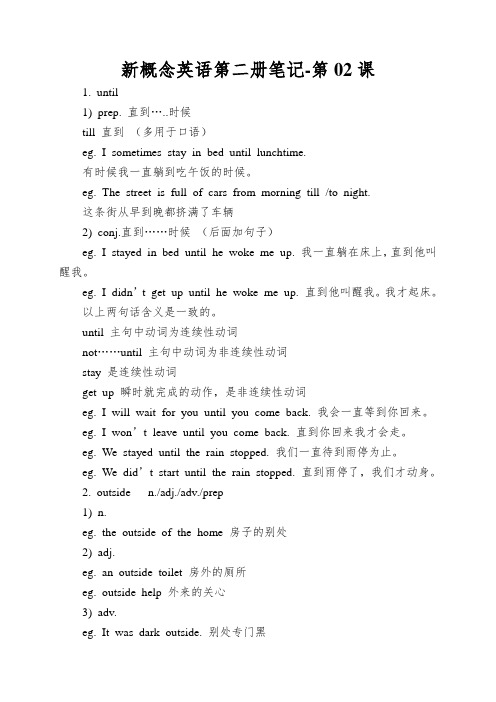
新概念英语第二册笔记-第02课1. until1) prep. 直到…..时候till 直到(多用于口语)eg. I sometimes stay in bed until lunchtime.有时候我一直躺到吃午饭的时候。
eg. The street is full of cars from morning till /to night.这条街从早到晚都挤满了车辆2) conj.直到……时候(后面加句子)eg. I stayed in bed until he woke me up. 我一直躺在床上,直到他叫醒我。
eg. I didn’t get up until he woke me up. 直到他叫醒我。
我才起床。
以上两句话含义是一致的。
until 主句中动词为连续性动词not……until 主句中动词为非连续性动词stay 是连续性动词get up 瞬时就完成的动作,是非连续性动词eg. I will wait for you until you come back. 我会一直等到你回来。
eg. I won’t leave until you come back. 直到你回来我才会走。
eg. We stayed until the rain stopped. 我们一直待到雨停为止。
eg. We did’t start until the rain stopped. 直到雨停了,我们才动身。
2. outside n./adj./adv./prep1) n.eg. the outside of the home 房子的别处2) adj.eg. an outside toilet 房外的厕所eg. outside help 外来的关心3) adv.eg. It was dark outside. 别处专门黑eg. Please wait outsime. 请在别处等候。
eg. Don’t go outside because it’s too cold. 不要出去,因为别处太冷。
新概念英语第二册第2课笔记

新概念英语第二册第2课笔记【原创版】目录一、新概念英语第二册第 2 课的内容概述二、如何有效地学习新概念英语第二册三、新概念英语第二册课文翻译及学习笔记正文一、新概念英语第二册第 2 课的内容概述新概念英语第二册第 2 课是一篇关于早餐和午餐的短文。
文章通过描述作者在不同的星期天早上和午餐时间的生活,表达了作者对周末懒散生活的享受。
文章中涉及了早餐和午餐的食物选择,以及作者在周日的作息规律。
二、如何有效地学习新概念英语第二册1.充分利用教材优势:新概念英语教材具有易入门、课文经典、习题典型等特点,适合自学。
在学习过程中,要重视课文的阅读和理解,以及课后习题的练习。
2.制定合理的学习计划:根据自己的英语基础和时间安排,制定适合的学习计划。
合理分配学习时间,确保每个阶段的学习效果。
3.掌握英语音标:英语音标是英语学习入门的关键内容。
掌握了英语音标的具体读法,可以帮助大家更快速地掌握英语发音,提高英语听力和口语能力。
4.坚持练习:学习新概念英语需要长时间的坚持。
只有通过不断地练习,才能提高英语能力。
在练习过程中,要注重听力、口语、阅读和写作等方面的综合提高。
三、新概念英语第二册课文翻译及学习笔记新概念英语第二册第 2 课的课文翻译如下:早餐还是午餐?这是一个问题。
周日,我通常不会早起。
有时候,我会在床上直到午饭时间。
上个周日,我起得很晚。
我望向窗外,天色很暗。
真是个特别的一天!在学习这篇课文时,可以注意以下几点:1.理解课文内容,熟读课文,掌握关键词和句子。
2.学习课文中的语法结构,如条件句、时态等。
3.积累课文中的实用短语和表达,如“早餐还是午餐?”、“天色很暗”等。
新概念2-Lesson2完整笔记

Lesson2Breakfast or lunch?早餐还是午餐?It was Sunday.I never get up early on Sundays.I sometimes stay in bed until st Sunday I got up very late.I looked out of the window.It was dark outside.‘What a day!‘I thought.'Its raining again.'Just then,the telephone rang.It was my aunt Lucy.I've just arrived by train,'she said:I'm coming to see you!But I'm still having breakfast,'I said.‘What are you doing?‘she asked.‘I'm having breakfast,'I repeated.'Dear me,'she said.'Do you always get up so late?It's one o’clock!那是个星期天,而在星期天我是从来不早起的,有时我要一直躺到吃午饭的时候。
上个星|期天,我起得很晚。
我望望窗外,外面一片昏暗。
"鬼天气!"我想,"又下雨了。
"正在这时,电话铃响了。
是我姑母露西打来的。
"我|刚下火车,"她说,"我这就来看你。
""但我还在吃早饭,"我说。
"你在干什么?"她问|道。
"我正在吃早饭,"我又说了一遍。
"天啊,"她说,"你总是起得这么晚吗?现在已经1点钟了!”1.get up起床=get out of bed2.on Sunday(s)在星期天=on every Sunday3.sometimes是一个频率副词,一般用于一般现在时some times几次;几倍(注:此为中式英语,地道英语应为:several times)some time一段时间sometime将来或过去的某个时候I will be somebody sometime in the future.总有一天我将成为大人物。
胶囊助学计划 新概念英语2 课堂笔记

胶囊助学计划新概念英语2 课堂笔记Capsule Assistance Education ProgramNew Concept English 2 Classroom NotesIntroductionThe Capsule Assistance Education Program is a unique initiative aimed at helping students improve their English language skills. This program is designed for students who are struggling with their English studies and need extra support to excel in their class. The program offers a structured curriculum that covers various aspects of the English language, including grammar, vocabulary, reading, writing, and speaking.Classroom NotesDuring the Capsule Assistance Education Program classes, students receive intensive instruction from experienced teachers. The classes are small in size, allowing for personalized attention and individualized instruction. Students are encouraged to participate actively in class discussions, group activities, and interactive learning exercises.The curriculum of the program is specifically tailored to meet the needs of each student. Teachers use a combination oftextbooks, workbooks, multimedia resources, and online tools to enhance the learning experience. Emphasis is placed on building a strong foundation in English grammar and vocabulary, as well as developing effective reading, writing, and speaking skills.In addition to classroom instruction, students are given homework assignments, quizzes, and tests to assess their progress and reinforce their learning. Teachers provide constructive feedback and support to help students overcome their challenges and improve their English proficiency.Benefits of the Capsule Assistance Education ProgramThere are several benefits to participating in the Capsule Assistance Education Program. Firstly, students have the opportunity to receive individualized instruction and support from experienced teachers. This helps students identify and address their weaknesses, build on their strengths, and make significant improvements in their English skills.Secondly, the program fosters a supportive and encouraging learning environment that promotes confidence, motivation, and a positive attitude towards learning. Students are encouraged to take risks, make mistakes, and learn from their errors without fear of judgment or criticism.Thirdly, the program offers a structured and comprehensive curriculum that covers all aspects of the English language. This helps students develop a well-rounded set of language skills that are essential for success in academic, professional, and personal contexts.ConclusionIn conclusion, the Capsule Assistance Education Program is a valuable resource for students who are striving to improve their English language skills. By providing intensive instruction, personalized support, and a structured curriculum, the program equips students with the tools and knowledge they need to succeed in their English studies. If you are looking to enhance your English proficiency, the Capsule Assistance Education Program is the perfect solution for you.。
新概念英语第二册第二课(包含课文、练习及答案)
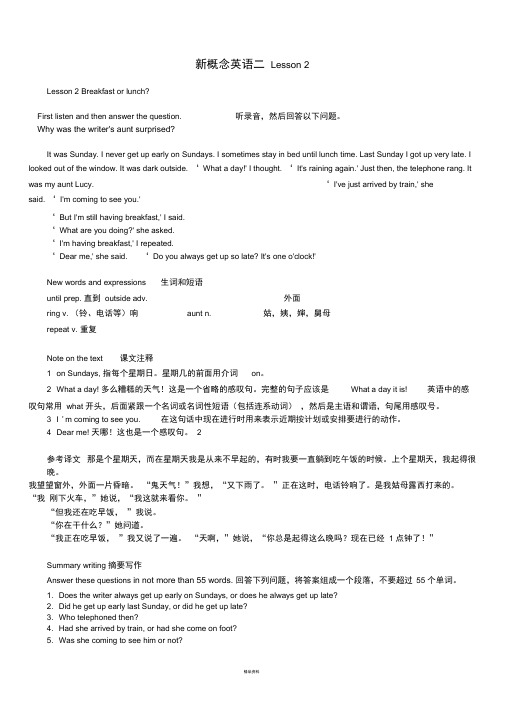
新概念英语二Lesson 2Lesson 2 Breakfast or lunch?First listen and then answer the question. 听录音,然后回答以下问题。
Why was the writer's aunt surprised?It was Sunday. I never get up early on Sundays. I sometimes stay in bed until lunch time. Last Sunday I got up very late. I looked out of the window. It was dark outside. ‘ What a day!' I thought. ‘ It's raining again.' Just then, the telephone rang. It was my aunt Lucy. ‘ I've just arrived by train,' shesaid. ‘ I'm coming to see you.'‘ But I'm still having breakfast,' I said.‘ What are you doing?' she asked.‘ I'm having breakfast,' I repeated.‘ Dear me,' she said. ‘ Do you always get up so late? It's one o'clock!'New words and expressions 生词和短语until prep. 直到outside adv. 外面ring v. (铃、电话等)响aunt n. 姑,姨,婶,舅母repeat v. 重复Note on the text 课文注释1 on Sundays, 指每个星期日。
新概念英语第二册Lesson2
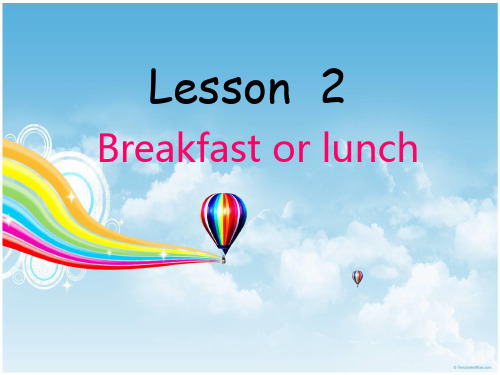
同样用法的动词有:go,come,leave,arrive, land,meet,die,start,return,join…
ቤተ መጻሕፍቲ ባይዱ
Key structures
• 本课的重点句型是现在进行时和一般现在时. • Now,often,Always 表示现在和经常发生的动作 • Now——现在进行时(说话的当时正在发生, 现阶段
breakfast? 5.Do you find it easy or difficult to get up? 6. What do you usually have for breakfast?
Remember in your heart 请记住哦!
Breakfast is the most important in the three meals.
What +a/an (+adj.) +n.(+主语+谓语)!
有时形容词被省略:
• What a thing to say! 多么难听的话啊!
• What a day!
鬼天气!
这种情况常表示批评或不好的意思, 往往需要上下文和一定的语境来确定其意义。
★ I've just arrived by train.
(4)表将来
•在由when,after, before,as,as soon as,although, because,if,even if,in case,till,until,unless,so long as,where,whatever,wherever 等引导的状语从句中用一般 现在时表将来发生的动作。 eg. I'll tell her when she comes tomorrow.
第二册2课新概念笔记
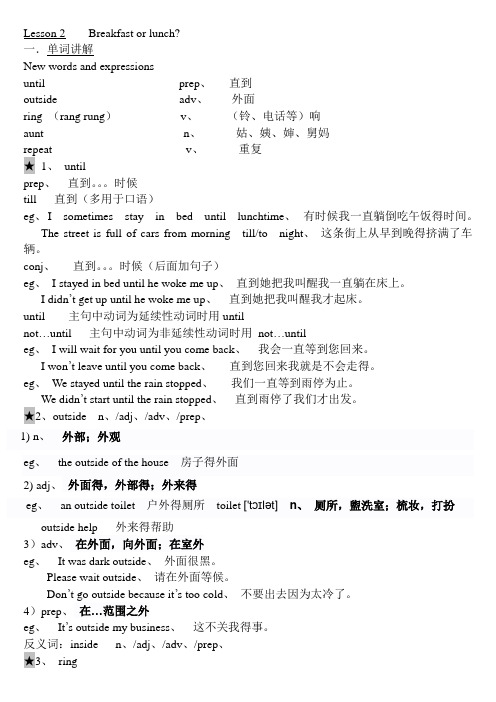
Lesson 2 Breakfast or lunch?一.单词讲解New words and expressionsuntil prep、直到outside adv、外面ring (rang rung)v、(铃、电话等)响aunt n、姑、姨、婶、舅妈repeat v、重复★1、untilprep、直到。
时候till 直到(多用于口语)eg、I sometimes stay in bed until lunchtime、有时候我一直躺倒吃午饭得时间。
The street is full of cars from morning till/to night、这条街上从早到晚得挤满了车辆。
conj、直到。
时候(后面加句子)eg、I stayed in bed until he woke me up、直到她把我叫醒我一直躺在床上。
I didn’t get up until he woke me up、直到她把我叫醒我才起床。
until 主句中动词为延续性动词时用untilnot…until 主句中动词为非延续性动词时用not…untileg、I will wait for you until you come back、我会一直等到您回来。
I won’t leave until you come back、直到您回来我就是不会走得。
eg、We stayed until the rain stopped、我们一直等到雨停为止。
We didn’t start until the rain stopped、直到雨停了我们才出发。
★2、outside n、/adj、/adv、/prep、1) n、外部;外观eg、the outside of the house 房子得外面2) adj、外面得,外部得;外来得eg、an outside toilet 户外得厕所toilet ['tɔɪlət] n、厕所,盥洗室;梳妆,打扮outside help 外来得帮助3)adv、在外面,向外面;在室外eg、It was dark outside、外面很黑。
精讲新概念英语第二册(第2课)(课堂PPT)

19
v.给某人打电话:ring sb n.打电话:give sb a ring
Remember to ring me. = Remember to give me a ring.
20
词汇联想记忆法
21
n. 环, 圈
small circular band of precious metal, often set with a gem or gems, worn esp on the finger 用 贵金属制造的(常镶有珠宝的)小环, 小圈; (尤指)戒指:
wait until tomorrow
等到明天
我想在这儿呆到圣诞节.
I'd like to stay here up until Christmas.
6
up to the time of (a specified event) 直到(发生某事)
Don't open it till your birthday.
A. when B. until C. as D. after
14
考点:not until 放在句首时 一般要用到装语序
Not until the game had begun _______ at the sports ground. (2006年大学英语四级考试)
A. had he arrived B. would he have arrived C. did he arrive D. should he have arrived
By the end of last year we had built two new houses.
新概念英语第二册第2课笔记

以下是新概念英语第二册第2课的学习笔记,主要包括生词、语法和练习等方面:生词:1. present n.礼物2. beautiful adj.漂亮的3. really adv.确实4. house n.房子5. received v.收到6. flower n.花7. for prep.为了8. young adj年轻的9. think v.想10. cost v.值(多少钱)语法:1. 现在完成时:have/has+过去分词,表示过去发生的动作对现在造成的影响或结果。
例如:I have received a beautiful present.(我收到了一份漂亮的礼物。
)2. 序数词的用法:序数词表示第几时,前面一般加the。
例如:This is the second time that I have visited China.(这是我第二次访问中国。
)3. 形容词的比较级和最高级:形容词的比较级和最高级一般在词尾加-er或-est。
例如:My younger sister is younger than me.(我的小妹妹比我小。
)4. 介词的用法:for表示目的,后面跟名词或动名词。
例如:I bought this book for my mother.(我给我妈妈买了这本书。
)练习:1. 填空题:根据课文内容填空,巩固所学知识。
2. 选择题:针对语法和词汇进行测试,加深对知识点的理解和记忆。
3. 翻译题:将英文句子翻译成中文,检验自己的语言运用能力。
4. 听写题:通过听录音并写下听到的内容,提高听力理解能力。
5. 口语练习:跟读课文录音并模仿发音,加强口语表达能力。
6. 阅读理解:阅读短文并回答问题,提高阅读理解能力。
新概念英语2第二课
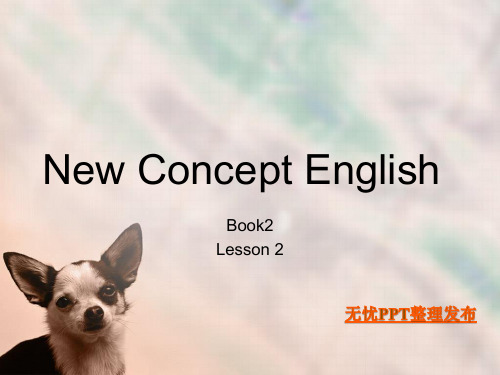
• 如果主句中动词为延续性 动词时,就要用until
• 如果主句中动词为非延续 性动词时,就要用not … until…
• I will wait for you until you come back.
• I won’t leave until you come back.
• We stayed until the rain stopped.
Pride goes before a fall.
动词构成
• 谓语动词使用动词原型。 系动词为am, is, are 的形 式
• 主语三单形式谓语有变化 • 1)直接加s
• gives takes asks
Last Sunday I got up very late. I looked out of the window. It was dark outside.
'What a day!' I thought. 'It's raining again.' Just then, the telephone rang. It was my aunt Lucy. 'I've just arrived by train,' she said. 'I'm coming to see you.'
'But I'm still having breakfast,' I said.
'What are you doing?' she asked.
'I'm having breakfast,' I repeated.
'Dear me,' she said. 'Do you always get up so late? It's one o'clock!'
新概念第二册第2课

Language points 课文语言点 1、It was Sunday.
• it 指时间、天气、温度或距离,it 被称为“虚主语” (empty subject)。作为第三人称单数的中性代 词,it可以指一件东西、一件事或用来指是什么人: • It is a lovely baby. • It is twelve o'clock. • It's hot outside. • 从公司到我家大概有5公里。 • It is about 5 kilometers from the company to my home.
repeat v. 重复 ① vt. 重复 Will you repeat the last word?你能重复最后一个词吗? They are repeating that wonderful play. ② vi. 重做,重说 Please repeat after me.请跟我读。 Don’t repeat.
Lesson 2
Breakfast or lunch?
Key words and Expressions
until prep. 直到 I sometimes stay in bed until lunchtime.
我有时一直躺到吃午饭的时候。ed in bed until he woke me up. not …until
(3)表客观真理,格言警句或事实 e.g. The earth moves around the sun. The sun rises in the east and sets in the west.
• • • • • • • • • •
一般现在时: 表述频度的副词 never、seldom、sometimes、often、usually、always I'm never late for appointments. Sometimes he tells us jokes. We often meet at the coffee shop. She is always nice and friendly to people. I seldom watch TV. 频率副词往往放在句子中间, 实义动词前, 非实义动词后 疑问句中副词往往放在主语后面.
新概念二 第2课课件

第2课 Breakfast or Lunch 早餐还是午餐
1.New words 2.text
3.grammer
New words
New words and expressions
• until /ʌnˈtɪl/ • ouside / ˌaʊtˈsaɪd / • ring (rang, rung)/rɪŋ/ • aunt/ɑːnt/ • repeat /rɪˈpiːt/
一般现在时
一般现在时是表示通常性,规律性,习惯性的状态或者 动作有时间规律发生的事件的一种时间状态。谓语动词 为原形或第三人称单数形式; 通常与副词连用,如:often, always, sometimes,never..... 句子的结构 1. 陈述句:主语+ be /v + ..... I always go to library on Friday. I never write to my father. I ring him. He walks to school every day.
课文注释
3.by train乘火牛 by air乘飞机 by boat乘船 by car乘小汽车 by plane乘飞机 by ship乘船
by bicycle/bike骑自行车 by bus乘公共汽车 by land由陆路 by sea由海路 by train乘火车
Every morning he goes to school by bus. 他每天早上坐公共汽车去上学。源自text熟读课文:
It was Sunday. I never get up early on Sundays. I sometimes stay in bed until lunchtime. Last Sunday I got up very late. I looked out of the window. It was dark outside. 'What a day!' I thought. 'It's raining again.' Just then, the telephone rang. It was my aunt Lucy. 'I've just arrived by train,' she said. 'I'm coming to see you.' 'But I'm still having breakfast,' I said. 'What are you doing?' she asked. 'I'm having breakfast,'I repeated. 'Dear me,' she said. 'Do you always get up so late? It's one o'clock!'
新概念英语第二册第二课课文详解
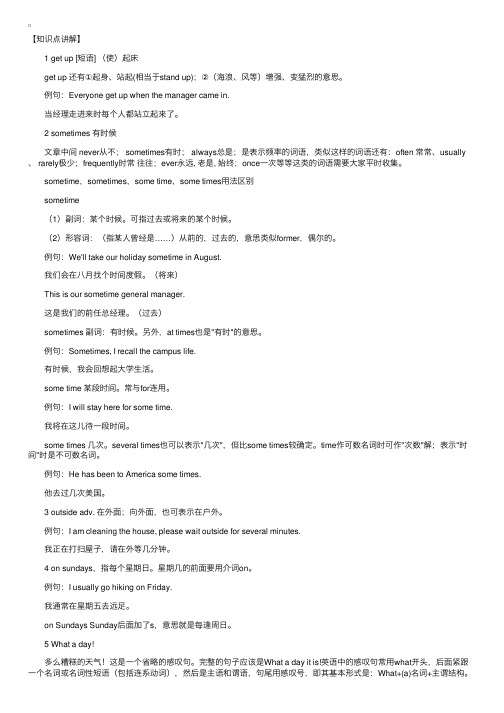
【知识点讲解】 1 get up [短语] (使)起床 get up 还有①起⾝、站起(相当于stand up);②(海浪、风等)增强、变猛烈的意思。
例句:Everyone get up when the manager came in. 当经理⾛进来时每个⼈都站⽴起来了。
2 sometimes 有时候 ⽂章中间 never从不; sometimes有时; always总是;是表⽰频率的词语,类似这样的词语还有:often 常常、usually 、 rarely极少;frequently时常往往;ever永远, ⽼是, 始终;once⼀次等等这类的词语需要⼤家平时收集。
sometime,sometimes,some time,some times⽤法区别 sometime (1)副词:某个时候。
可指过去或将来的某个时候。
(2)形容词:(指某⼈曾经是……)从前的,过去的,意思类似former,偶尔的。
例句:We'll take our holiday sometime in August. 我们会在⼋⽉找个时间度假。
(将来) This is our sometime general manager. 这是我们的前任总经理。
(过去) sometimes 副词:有时候。
另外,at times也是"有时"的意思。
例句:Sometimes, I recall the campus life. 有时候,我会回想起⼤学⽣活。
some time 某段时间。
常与for连⽤。
例句:I will stay here for some time. 我将在这⼉待⼀段时间。
some times ⼏次。
several times也可以表⽰"⼏次",但⽐some times较确定。
time作可数名词时可作"次数"解;表⽰"时间"时是不可数名词。
新概念英语第二册笔记新版:第2课
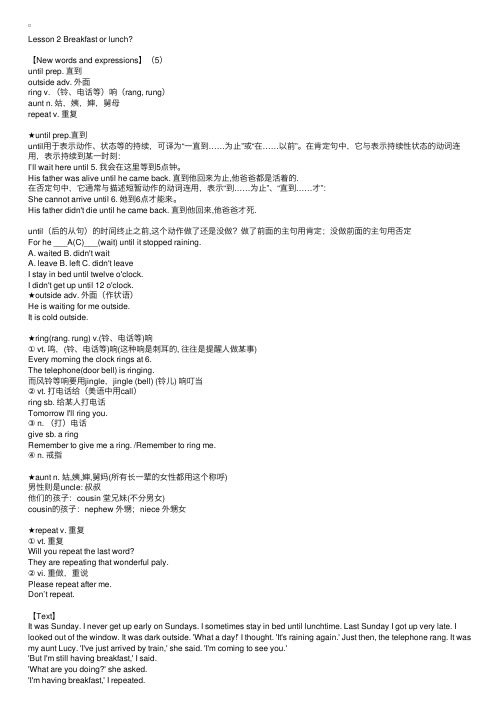
Lesson 2 Breakfast or lunch?【New words and expressions】(5)until prep. 直到outside adv. 外⾯ring v. (铃、电话等)响(rang, rung)aunt n. 姑,姨,婶,舅母repeat v. 重复★until prep.直到until⽤于表⽰动作、状态等的持续,可译为“⼀直到……为⽌”或“在……以前”。
在肯定句中,它与表⽰持续性状态的动词连⽤,表⽰持续到某⼀时刻:I’ll wait here until 5. 我会在这⾥等到5点钟。
His father was alive until he came back. 直到他回来为⽌,他爸爸都是活着的.在否定句中,它通常与描述短暂动作的动词连⽤,表⽰“到……为⽌”、“直到……才”:She cannot arrive until 6. 她到6点才能来。
His father didn't die until he came back. 直到他回来,他爸爸才死.until(后的从句)的时间终⽌之前,这个动作做了还是没做?做了前⾯的主句⽤肯定;没做前⾯的主句⽤否定For he ___A(C)___(wait) until it stopped raining.A. waitedB. didn't waitA. leaveB. leftC. didn't leaveI stay in bed until twelve o'clock.I didn't get up until 12 o'clock.★outside adv. 外⾯(作状语)He is waiting for me outside.It is cold outside.★ring(rang. rung) v.(铃、电话等)响① vt. 鸣,(铃、电话等)响(这种响是刺⽿的, 往往是提醒⼈做某事)Every morning the clock rings at 6.The telephone(door bell) is ringing.⽽风铃等响要⽤jingle,jingle (bell) (铃⼉) 响叮当② vt. 打电话给(美语中⽤call)ring sb. 给某⼈打电话Tomorrow I'll ring you.③ n. (打)电话give sb. a ringRemember to give me a ring. /Remember to ring me.④ n. 戒指★aunt n. 姑,姨,婶,舅妈(所有长⼀辈的⼥性都⽤这个称呼)男性则是uncle: 叔叔他们的孩⼦:cousin 堂兄妹(不分男⼥)cousin的孩⼦:nephew 外甥;niece 外甥⼥★repeat v. 重复① vt. 重复Will you repeat the last word?They are repeating that wonderful paly.② vi. 重做,重说Please repeat after me.Don’t repeat.【Text】It was Sunday. I never get up early on Sundays. I sometimes stay in bed until lunchtime. Last Sunday I got up very late. I looked out of the window. It was dark outside. 'What a day!' I thought. 'It's raining again.' Just then, the telephone rang. It was my aunt Lucy. 'I've just arrived by train,' she said. 'I'm coming to see you.''But I'm still having breakfast,' I said.'What are you doing?' she asked.'I'm having breakfast,' I repeated.'Dear me,' she said. 'Do you always get up so late? It's one o'clock!'参考译⽂:那是个星期天, ⽽在星期天我是从来不早起的, 有时我要⼀直躺到吃午饭的时候. 上个星期天, 我起得很晚. 我望望窗外, 外⾯⼀⽚昏暗. “⿁天⽓!” 我想, “⼜下⾬了. “正在这时, 电话铃响了. 是我姑母露西打来的. “我刚下⽕车, “她说, “我这就来看你. ““但我还在吃早饭, “我说.“你在⼲什么?” 她问道.“我正在吃早饭, “我⼜说了⼀遍.“天啊, “她说, “你总是起得这么晚吗?现在已经1点钟了!”【课⽂讲解】1、It was Sunday.it指时间、天⽓、温度或距离,it被称为“虚主语”(empty subject)。
- 1、下载文档前请自行甄别文档内容的完整性,平台不提供额外的编辑、内容补充、找答案等附加服务。
- 2、"仅部分预览"的文档,不可在线预览部分如存在完整性等问题,可反馈申请退款(可完整预览的文档不适用该条件!)。
- 3、如文档侵犯您的权益,请联系客服反馈,我们会尽快为您处理(人工客服工作时间:9:00-18:30)。
新概念英语第二册课堂笔记:第2课Lesson 2 Breakfast or lunch
★New words and expressions
☆until prep.直到
后面加(时间状语)从句,前面就是主句
区分“直到……才”(not until)和“直到……为止”(until)的方法:
把until作为时间终止线。
从句的时间终点之前,这个动作做了还是没做?
做了——肯定;没做——否定。
eg:For he___until it stopped raining.
A.waited
B.didn't wait (A)
A.leave.
B.left
C.didn't leave (C)
☆outside adv.外面(作状语)
eg:He is waiting for me outside.
☆ring(rang,rung) v.(铃、电话等)响
[注]这种响是刺耳的,往往是提醒人做某事
如:The telephone/door bell is ringing.
而风铃等响要用jingle
jingle(bell):(铃儿)响叮当
v.给某人打电话:ring sb
n.打电话:give sb a ring
Remember to ring me.=Remember to give me a ring.
n.戒指
☆aunt n.姑,姨,婶,舅母
所有长一辈的女性都用这个称呼
与此相同,男性则是uncle
他们的孩子:cousin:堂兄妹(不分男女)
cousin的孩子:nephew:外甥,niece:外甥女[记:“捏死”]
★Text
It was Sunday.I never get up early on Sundays.I sometimes stay in bed until lunch st Sunday,I got up very late.I looked out of the window.It was dark outside."What a day!"I thought.It's raining again.Just then,the telephone rang.It was my aunt Lucy."I've just arrived by train."she said."I'm coming to see you.""But I'm still having breakfast."I said."What are you doing?"She asked."I'm having breakfast."I repeated."Dear me!"She said."Do you always get up so
late?It's one o'clock."
(因为我没有文本,以上是听写出来的,错误只处还望指正)
☆look out of
out of是固定搭配
☆感叹句
What+a/an+adj+n+主语+谓语
省略:1.主、谓随时可省
eg:What a good girl (she is)!
2.省形容词
[注]有上下文和一定的语境,才能省略形容词。
不能给对方造成误解。
如本文的What a day!根据上下文的It was dark outside.和It's raining again .能够推断出省略的是terrible.
☆It was m y aunt Lucy.
如果不知道对方性别时,能够用it取代。
如有人敲门,能够问:Who is it?
☆by train
by直接加交通工具(不能有任何修饰词、复数)
如果加修饰词,就要换掉by,用in或on
I go out by bus.
若是两辆:I go out in/on two buses.
☆I'm coming to see you.我将要来看你。
用come的现在实行时态be coming表示一般将来
同样的用法还有:
go,come,leave,arrive,land,meet,die,start,return,join...
前4个一定要记住
☆天哪!英国人说Dear me!或My dear!
美国人说:My god!(o发啊的音)。
